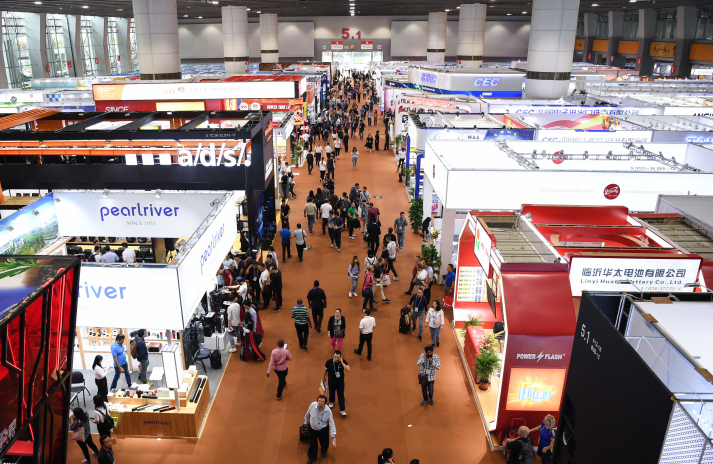|
||||||||||
| Home Nation World Business Opinion Lifestyle ChinAfrica Multimedia Columnists Documents Special Reports |
|
||||||||||
| Home Nation World Business Opinion Lifestyle ChinAfrica Multimedia Columnists Documents Special Reports |
| ChinAfrica |
| The first online Canton Fair brings new impetus to Sino-African trade ties |
| For most Chinese and African traders, this transition came just in time to inject fresh momentum in their business relationships, despite the hardships resulting from the pandemic |
| By Li Xiaoyu VOL.12 August ·2020-08-11 |



The China Import and Export Fair, also known as the Canton Fair, is China's oldest trade fair. It is also the largest, as it covers an area equivalent to 166 football pitches. Due to the COVID-19 pandemic, the 127th edition of this biannual trade fair was held online from June 15 to 24 for the first time since its creation in 1957.
For most Chinese and African traders, this transition came just in time to inject fresh momentum in their business relationships, despite the hardships resulting from the pandemic.
A meeting place
As China's open window to the outside world, the Canton Fair is one of the main catalysts for the promotion of Sino-African trade. According to statistics, each year the fair attracts about 15,000 African traders, representing 5 percent of the total number of buyers taking part in the event.
Togolese buyer Sena Bossou is a participant and a direct beneficiary of the fair. "At the Canton Fair, we have the chance to discover new products, establish new contacts with factories, and think about setting up certain manufacturing units in Africa," he said.
On the suppliers' side, the Canton Fair is also a valuable platform. This is the case, among others, of Kebeln, a Chinese plastic extrusion machine manufacturer based in Guangdong Province in south China. Since it was created in 2005, the company has not missed a single chance to take part in the Canton Fair. In each of the last 10 events, the company received no less than 100 African customers every day, who came to enquire and negotiate prices. Dozens of orders have been placed each time, said Gao Conghua, Kebeln's Managing Director.
The networks created through the fair also resulted in significant follow-up transactions, which can amount to as much as 80 percent of total signed deals, according to figures published by the Canton Fair organizer. In the case of Kebeln, the manufacturer was able to take advantage of the fair to expand its market in Africa. Its products are now available in 27 African countries. Exports to Africa account for 58 percent of its total export earnings. In 2016, during the visit of a trade delegation led by Kashim Shettima, former Governor of Borno State in Nigeria, the company established a partnership which extended into an infrastructure project that was valued at 10 million yuan ($1.43 million).
Turning the corner
Kebeln's trade ties with Africa have been heavily impacted by the COVID-19 pandemic. The company used to receive hundreds of trade delegations like the one from Nigeria every year. But in the first quarter of this year, it did not receive a single visit. When he learned that the 127th Canton Fair, originally scheduled for April 15, would be held online in June, Gao saw a glimmer of hope.
According to Xu Bing, a spokesperson for the Canton Fair, companies have been exempted from paying participation fees in this edition. Holding the fair online is aimed at reducing the negative economic fallout of the current health crisis on companies.
The Kebeln team was well prepared to seize this opportunity, trying to meet the demands of the new type of trade fair as best as they could. Without being able to meet customers face to face, companies were asked to exhibit their goods and services through photos, videos and livestreaming on an official website. To this end, Kebeln hired broadcasting specialists and even acquired a 3D showroom. Its presenter and her assistants rehearsed many times before the first broadcast.
On the African side, several buyers such as Bossou appreciated the idea of holding the fair in the cloud. For him, this made it possible for buyers to look at and procure what they want without having to travel all the way to China, while spending less. "They do not have to pay for airplane tickets, fair tickets and housing, among other things. From that point of view, there are advantages when compared to an offline trade fair," he said.
Still a long way to go
Nevertheless, Bossou regrets that quite a few people among the African customers he knows found it difficult to access the trade fair in the cloud due to the lack of adequate Internet infrastructure in Africa.
Others expressed similar frustrations, mostly related to problems with after-sales services, including verification of goods and means of payment. The Africa Guangdong Business Association (AGBA) raised this issue in its discussions with local chambers of commerce in about 20 African countries at the beginning of the trade fair. It called on relevant departments to create a service system adapted to e-commerce and to standardize their services.
"We can start by classifying services by industry and country. When it comes to household appliances, for example, we should pay more attention to the verification system," said Huo Jiangtao, Vice President of AGBA. "This is to reduce mistrust toward e-commerce."
The initiative was able to dispel the doubts of some merchants. "We have received a lot of positive feedback about this online fair so far. Most of our partners in Africa told us how easy it was to communicate with suppliers," said Lineo Kobeli of AGBA Public Relations Department.
As for Kebeln, its efforts were also well rewarded. Thanks to the online platform, the company was able to resume the business ties it has been nurturing for some 15 years with its "old friends." New customers were also present, such as Abraham R. Merishani, a Tanzanian businessman. Merishani has been working in foreign trade in Guangzhou, the capital of Guangdong, for more than 20 years. His business consists of reselling high-quality Chinese products on the African market. The day after the Canton Fair, he continued to negotiate with the Kebeln team.
"Today, construction is booming in Africa. We can create more jobs for our people by providing the kind of products we need," said Merishani, who sees great potential in their future cooperation. CA
(Print Edition Title: Trading in the Cloud)
Comments to lixiaoyu@chinafrica.cn
| About Us | Contact Us | Advertise with Us | Subscribe |
| Copyright Beijing Review All rights reserved 京ICP备08005356号-5 京公网安备110102005860号 |